Embarking on a journey of self-healing through writing can be an uplifting and profoundly personal experience. It offers a cathartic release, helping us find inner peace and navigate complex emotions.
In today’s piece, we will share a range of journal prompts for healing, unfolding a treasure trove of inspiration to fuel your writing exploration. Whether you are coping with loss, stress, or changes, or you just want to deepen your self-understanding journey, our diverse list of prompts will act as your guide to self-discovery and restoration.
So, gather your favorite pen, a comforting cup of tea, and your journal—let’s begin our journey through the power of words and self-reflection together. 🤗
Embracing Positive Affirmations
Embracing Positive Affirmations through journaling supports our internal dialogue to shift towards more healing and optimistic thoughts, leap-frogging us towards our journey of personal growth. Here are 20 prompts that encourage you to write affirmations and create a positive mindset:
- Write a positive affirmation focusing on your strength and resilience.
- List three things you love about yourself and turn each into an affirmation.
- Recall a time you overcame a challenging situation. Write an affirmation based on this experience.
- Create an affirmation to help you stay focused on your current goals.
- Write an affirmation addressing one of your insecurities and reaffirm your worth.
- Imagine your ideal self five years from now. Write an affirmation that bridges you to this future self.
- Draw upon a compliment you received recently, and turn that into a daily affirmation.
- Write an affirmation to remind yourself of your value when you feel inadequate.
- Create an affirmation that supports your emotional healing.
- Write an affirmation that encourages self-love and self-respect.
- Think about an area in your life you want to improve. What affirmation aligns with this goal?
- Write an affirmation to boost your attitude of gratitude.
- Design an affirmation that nourishes your self-esteem.
- Craft an affirmation to promote body positivity.
- Write an affirmation to support you during stressful times.
- Think of a fear or worry. Develop an affirmation to lessen its influence on you.
- Write an affirmation reminding you of your ability to grow and change.
- Create an affirmation that embraces all your imperfections.
- Transform a negative thought you often have into a positive affirmation.
- Write an affirmation expressing the joy and happiness you want to invite into your life.
Creating Healing Spaces
Creating Healing Spaces through journaling can lay the groundwork for physical, mental, and emotional healing. Here are 20 prompts to guide you in creating those spaces within your journal entries:
- Describe what a healing space looks like to you.
- Write about a time you felt emotionally healed. What elements contributed to your healing?
- Imagine your ideal place for physical healing. Describe every detail of that environment.
- Write about three things that make you feel safe and harbored. How can you incorporate them into your day?
- Write a letter to yourself describing why you are deserving of a healing space.
- Draw or jot down elements that represent a serene environment for you.
- Record the changes you would make to your current surroundings to create a healing space.
- List sensory experiences that give you peace. For example, a scent, a texture, a taste, or a sound.
- Describe how you want to feel when you enter your healing space.
- Label the negative influences that you would want to remove from your current environment.
- Reflect on people, objects, or rituals that provide comfort. How can you incorporate them into your space?
- Write about your favorite peaceful pastime or hobby. How does it contribute to your healing process?
- Visualize a healing space that would cater specifically to your mental well-being. Describe this place in detail.
- Record what aspects or attributes you’d want in a healing companion or support person.
- Write about how practicing mindfulness can affect your healing space.
- Jot down your favorite comforting phrase or mantra that could serve as a reminder within your healing environment.
- List five items you would love to have in your healing space and explain why.
- Recall a location that made you feel rejuvenated and describe what you loved about it.
- Write about how you can replicate that feeling of rejuvenation in your own space.
- Reflect on the connection between your emotions and your surroundings. How can you create a space that fosters positive emotions?
Harnessing Emotional Resilience
Harnessing emotional resilience through journaling can facilitate better stress management and deeper personal insight. Here are 20 writing prompts to facilitate emotional resilience as part of your journaling practice:
- Consider a recent disappointment or failure. Write about the positive implications or opportunities that could come from this experience.
- Recall a time when you overcame adversity. Describe the experience and the resilience you demonstrated.
- Write a letter to your future self who has successfully managed a current problem or challenge.
- Identify the activities or practices that replenish your emotional energy. How can you incorporate more of these into your life?
- List three things you're grateful for, and explain why.
- Write about a person who exemplifies resilience for you. What qualities do they possess?
- Document a challenge you recently faced and the steps you took to manage it.
- Describe an instance where you experienced significant personal growth from facing adversity.
- Write about a time when you felt devastated and how you were able to bounce back.
- List the core beliefs and values that underpin your resilience.
- Reflect on how you've changed as a person due to past hardships or struggles.
- Write down one setback you encountered this week, and describe how you can recover from it.
- Remember a traumatic event from your past. What steps have you taken to heal and bounce back?
- Visualize a future scenario that you've stressed about. Create a plan outlining how you could handle it effectively.
- Document a time when a setback led you to a better opportunity.
- Write about how you would feel and what your life would look like when you have fully developed your emotional resilience.
- Describe the most significant barrier to your resilience and brainstorm ways to overcome it.
- Remember a time when you felt like you wouldn't overcome a problem, but did. How was this possible?
- Write about an experience that initially seemed negative, but later turned out to have positive implications.
- Visualize your resilience as a physical object or symbol. What does it look like and why?
Exploring Gratitude
Exploring Gratitude through journaling helps us appreciate the positives in our lives and promotes self-healing, significant in sustaining mental health. Here are 20 writing prompts about Exploring Gratitude to incorporate in your journaling routine:
- Reflect on a person who has made a significant impact on your life. What are you most thankful for about this person?
- Think about an unexpected joy you experienced recently. How did it make you feel?
- Write about a challenge you have overcome and what you learned from it.
- List ten everyday objects around you that you're grateful for.
- Reflect on a skill or talent you have, and express gratitude for it.
- Recall a favorite childhood memory and express your gratitude.
- Write about a failure or setback that led to growth or learning. Why are you thankful for this experience?
- Pen a thank you letter to someone who will never get to read it.
- What is a personal quality you're grateful for and why?
- Detail a moment in nature you are grateful for and describe why.
- List five things about your health that you are thankful for.
- Write about a trial or difficulty for which you now feel gratitude.
- Think about an aspect of your culture or tradition you are grateful for and elaborate on it.
- Reflect on the current season, what do you appreciate about it?
- List three characteristics you appreciate about a friend or family member.
- Detail a book, show, or movie for which you are grateful. Why did it impact you?
- Reflect on a time when you gave back to your community. How did it make you feel?
- Write about a favorite place that brings you peace and gratitude.
- List five simple pleasures you experienced this week that you are thankful for.
- Reflect on a past success and write about why you are grateful for it.
Reframing Negative Thoughts
Reframing Negative Thoughts through journaling allows us to reshape our perspective and build healthier thought patterns that cultivate emotional healing and well-being. Here are 20 writing prompts to help you in this process:
- Document a recurring negative thought and write a positive reinterpretation of it.
- Reflect on a recent event that triggered negative thoughts. How could you perceive it differently?
- Write about an instance when you overcame negativity. How did you feel afterwards?
- Describe a problem you're facing. What are some positive outcomes that could come out of it?
- List three words that you would use to describe your state of mind today. Now, write three alternative, more positive descriptors.
- Think of a person who often triggers negative thoughts in you. Write about their qualities that you admire or respect.
- Record a negative self-belief you hold about yourself. How could you reframe it into a positive affirmation?
- Imagine you told a friend about a negative thought you have. How do you envision they'd encourage you?
- Write about a annoyance and pivot towards finding something positive about it.
- Identify a fear. Flip it on its head by writing about what makes you feel safe.
- Write about a time when you turned a disadvantage into an advantage. What negative thoughts did you have to overcome?
- Describe a situation where you felt lost. Write about tools or resources you discovered as a result.
- Jot down a past regret. What valuable lessons did you gain from that experience?
- Write about a negative thought you've held onto for a long time. How can you make peace with it?
- Detail a failure using non-judgmental language. What growth or learning did you get from it?
- Identify a difficult person in your life, and write about a trait of theirs you could benefit from.
- Write about a negative event from your past. How did it shape you in a positive way?
- List a negative assumption you have about others. How can you challenge that assumption and perceive others in a more positive light?
- Document an unfulfilled aspiration. How could this unmet goal open up other paths forward you had not considered before?
- Reflect on a time when you were pessimistic about an outcome. Can you find some positive aspects in the result that you didn’t initially see?
Processing Grief And Loss
Grief and loss are profound emotions that can be cathartically explored and processed through the therapeutic activity of journaling. Here are 20 writing prompts to guide and aid in your journey towards healing.
- List five things you will cherish and remember about the person you lost.
- Imagine a conversation you'd want to have with the person or thing you lost. Write it down as a script or dialog.
- Write about how your life has changed since your loss.
- Describe your favorite memory with the person you’ve lost.
- How do you want the person you lost to be remembered?
- What are three regrets, if any, related to your loss? How can you find forgiveness or peace with these regrets?
- Write about the first time you experienced loss. How did that situation change you?
- What are some physical sensations or feelings you associate with your grief?
- How can you turn your grief into a source of growth and strength?
- Write a letter to your future self about what you learned from this experience.
- What is the hardest part about losing someone or something important to you?
- Visualize a safe place or happy memory. Describe it in great detail.
- Write down five things that have been helpful to your healing process.
- List three people who have been supportive during this time and why you are grateful for them.
- What would you say to someone else going through a similar loss?
- If you could travel back in time, what could you say or do differently?
- How do you interpret your dreams since the loss? Write them down and reflect.
- Imagine a day when the pain of this loss has lessened. What does it look like?
- Reflect on the different stages of grief you have gone through so far.
- Write about how you would like to remember this period of grief and healing.
Finding Forgiveness
Finding Forgiveness through journaling offers a path to alleviate emotional burdens, providing a sense of self-growth and liberation. Below are 20 prompts that could help you discover the power of forgiveness on your healing journey:
- Reflect on a time when you found it hard to forgive someone. What was holding you back?
- Imagine that you've forgiven someone who has wronged you. How would this shift in perspective change your emotions?
- Recount an instance where someone forgave you. How did their act of forgiveness make you feel?
- Write a letter expressing forgiveness to someone who harmed you.
- Envision the positive impact forgiveness could bring to your life. What changes can you anticipate?
- Write about a personal mistake for which you found it hard to forgive yourself. What steps can you take towards self-forgiveness?
- What are three things you appreciate about yourself that help you believe in your ability to forgive?
- Describe a fictional scenario where forgiveness leads to a happier ending.
- Think of a world leader or historical figure who demonstrated forgiveness remarkably. How can their action inspire you?
- Write a letter of understanding to a person who hurt you, focusing on empathy rather than resentment.
- Imagine the feeling of unburdening your heart by releasing resentment. How would your life improve?
- Write down any fears or worries that might be obstructing your path towards forgiveness. How can you address these fears?
- Recall a time when you forgave effortlessly. What made it easy?
- Pen down a dialogue involving forgiveness between you and your past self.
- Visualize a future where you've managed to forgive those who have wronged you. How has this transformed you as a person?
- Write a heartfelt apology to yourself for past mistakes. What do you want to forgive yourself for?
- List three benefits that forgiveness can bring to your mental health.
- Scribe a scene in which you meet the person who hurt you – how would you express your forgiveness to them now?
- Imagine your life without the weight of resentment. What feelings and experiences would take its place?
- Focus on the beauty of forgiveness. How is it represented in nature, art, or other forms of emotional expression?
Exploring Self Love And Compassion
Exploring self love and compassion through journaling enables us to embrace and enhance our self-worth and kindness towards ourselves, sparking personal growth and healing within our lives. Here are 20 writing prompts to assist you in this journey of self exploration:
- Write about a time you treated yourself with kindness. What made you do that?
- Note down three things that you love about your personality today.
- Reflect on a moment when self-love helped you navigate a difficult situation.
- List down five ways you can practice self-compassion this week.
- Describe an instance where you extended love and compassion to yourself despite your shortcomings.
- Imagine your best self in five years. Write a letter expressing admiration for their accomplishments and struggles.
- What does the phrase 'being gentle with oneself' mean to you? Describe it.
- Write a compassionate letter to yourself addressing an insecurity or fear you grapple with.
- List down five personal attributes you admire and appreciate about yourself.
- Recall a moment when you felt proud of how you handled a difficult situation. Write about it in detail.
- Document how you can extend love and compassion to yourself when you're struggling.
- Describe a situation where you feel a lack of self love or compassion.
- Jot down five affirmations that amplify self love and compassion within you.
- Write about a moment where you were able to replace a negative thought with a loving one.
- Envision your life if you practiced self love and compassion every day. What differences do you notice?
- Describe three ways you can imbibe self love in your daily routine.
- Reflect on the relationship you have with yourself. How can you improve it with self love and compassion?
- Write about a personal challenge and how showing compassion towards yourself has/will help you tackle it.
- Create a list of activities that nurture self love and compassion within you.
- Write a genuine, compassionate letter to your future self about the importance of self-love and positivity.
Understanding Stress And Coping Mechanisms
Harnessing the power of journaling can provide critical insights into our stressors and help establish effective coping mechanisms for healing. Here are 20 thought-provoking prompts that center around understanding stress and cultivating coping strategies:
- Identify a stressful event that happened recently. How did you react to it?
- Detail three physical symptoms you experience when under stress. Where in your body do you feel it?
- Write about a recurring worry that hinders your peace of mind.
- Reflect on a time when stress actually ended up leading to a positive outcome.
- Describe an instance where you successfully managed a stressful situation. How did it make you feel?
- List five stress-relief techniques you have tried in the past. How effective have they been?
- Think back to a stressful period in your life. What would you tell your past self based on what you know now?
- Write a letter to stress, expressing your thoughts towards it honestly and openly.
- Visualize a ‘stress-free’ life. Describe what it looks like.
- Identify three things that you could do today to minimize your stress.
- Reflect on the role that stress plays in your life. Is there any way it benefits you or helps you grow?
- Write about a situation that's stressing you right now. What are some solutions or steps you could take to alleviate it?
- Describe a time when your coping mechanism actually worked. What exactly did you do and what was the outcome?
- Discuss any fears or worries you have about the future and how they make you feel.
- Personalize your stress. If it were a character or creature, what would it look like?
- Brainstorm the difference between a healthy and unhealthy reaction to stress.
- Reflect on a situation where stress held you back from moving forward. What could you have done differently?
- Describe a situation where you were not able to manage stress right away. How did you eventually cope with it?
- Write down three affirmations to read when you're feeling overwhelmed.
- Imagine your life ten years from now. How do you hope to deal with stress in this future scenario?
Unleashing Inner Strengths And Abilities
Tapping into your inner strengths and abilities through a healing journal can foster resilience and self-empowerment, acting as a catalyst for personal growth. Explore these notions with the following 20 writing prompts:
- Recall a situation where you demonstrated resilience. What did this experience teach you?
- Envision your ideal self in five years. What qualities and abilities have you developed?
- Write a letter to your past self, highlighting the strengths you have discovered since then.
- Think about an ability you are proud of. How can you utilize this skill to better your future?
- List three strengths that you appreciate about yourself.
- Describe a time when you felt emotionally strong. How did this feeling enhance your actions?
- Reflect on a challenge that made you stronger. What strength did you discover within you during this time?
- Write about someone who inspires you with their strengths. How can you learn from them?
- Picture having achieved a major goal. What inner strength helped you reach it?
- Document your greatest accomplishment and which of your abilities made it possible.
- Convey your feelings about a strength you're developing. How are you nurturing it?
- Write a motivational pep-talk to yourself for those times when you feel weak.
- Reflect on a moment where you overcome fear. What inner strength helped you conquer it?
- Make a list of ways your strengths have benefited you in your personal relationships.
- Consider a situation where you had to use your inner strength to stick to your beliefs. What was the outcome?
- Describe how you can use your strengths to improve your community.
- Think about periods of growth in your life. How did your inner strengths play a role?
- Write about how healing contributes to your ability to tap into your inner strengths.
- Detail a situation where you tapped into an unknown strength. What pushed you to access it?
- Construct a gratitude list specifically for your strengths and abilities, and how they have shaped your life.
Mind-body Connection
Exploring the mind-body connection through journaling allows us to understand and heal ourselves holistically, integrating our mental, emotional and physical experiences. Here are 20 writing prompts to delve deeper into your mind-body connection:
- Describe a time when your body reacted strongly to a feeling or thought, for instance, the sensation in your stomach before an important presentation.
- Reflect on a physical activity that makes you feel mentally invigorated. How does your mindset change during and after the activity?
- Write about a time you listened to your body's signals (like hunger or fatigue) and how it affected your wellbeing.
- Journal about a situation when you suppressed your feelings and noticed a change in your body, such as tension or discomfort.
- Think about a positive thought or feeling that invokes a physical response. Describe how it manifests in your body.
- Write in detail about an event that both mentally and physically exhausted you. What did it teach you about your limits?
- Focus on a physical hardship you experienced. How did it affect your mental or emotional health?
- Write a thank-you note to your body for supporting you through a difficult emotional time.
- Identify three ways your physical state impacts your mood or thoughts.
- Journal about a memory in which physical pain connected with your emotional state.
- Reflect on a time when your mind helped you overcome a physical obstacle or discomfort, such as pushing through the last mile of a run.
- Write about how you feel when you're physically well-rested. How does that affect your mental clarity and emotional equilibrium?
- Describe a time when physical exhaustion affected your mood or behavior.
- Explore a moment of strong emotional happiness. How did it feel in your body?
- Write about a physical activity that centers you or eases your mind.
- Record the physical sensations of a powerful emotion, such as anger or love.
- Consider a time when you felt mentally strong. How was your body involved in that experience?
- Reflect on how stress physically manifests in your body.
- Write about a time when gratitude filled you. How did that shape your physical state?
- Think about a goal you have for your physical wellbeing. How is it linked to your mental or emotional health?
Re-discovering Peace
Journaling about re-discovering peace helps you reconnect with a serene and calm state of mind, facilitating personal healing and wellness. Here are 20 writing prompts to guide you on this journey to rediscovering peace:
- Write down three simple things that make you feel peaceful.
- Describe a peaceful place you've visited and how it affected you.
- Reflect on a time when you felt truly at peace. What made you feel this way?
- Identify three activities that bring you peace and how they help.
- Jot down one thought that disrupts your peace frequently, and how you can address it.
- Recall a peaceful encounter you had recently, write about it in detail.
- Write a letter to your future self about the peace you wish for them.
- Describe how peace feels to you. Use as much sensory detail as possible.
- List the obstacles that keep you from feeling at peace and brainstorm solutions for each.
- Create a step-by-step guide to a peaceful day for yourself.
- Reflect on a peaceful person you admire. Write about the qualities they possess that make them peaceful.
- Write a peaceful mantra for yourself and elaborate why you chose it.
- Describe a peaceful moment you experienced in nature.
- Imagine a world where everyone is at peace. What does it look like?
- Identify one habit you can start practicing that will bring more peace into your life.
- Write about the relationship between forgiveness and peace in your life.
- Reflect on a peaceful dream you've had. How can you bring elements of it into your reality?
- Identify one change you can make in your environment to foster more peace.
- Write about a recent conflict and how you could have handled it more peacefully.
- List three goals you have for the future related to finding peace in your life.
Journey To Self-awareness
Embarking on a journey to self-awareness through journaling leads to a profound internal exploration that encourages healing and growth, facilitating a deeper understanding of our thoughts, emotions, and behaviors. Here are 20 prompts to assist in your voyage towards heightened self-awareness:
- Write about your biggest strength and how it benefits you.
- Discuss an old belief you've changed and what led to this shift.
- Reflect on your most important values. Why do they matter to you?
- Record a situation where you acted against your values. What would you do differently now?
- Examine a recurring dream or thought. What message could it be sending?
- Discuss a trait you admire in others. How can you develop this in yourself?
- Describe an emotion you find difficult to handle. How can journaling help manage it?
- Pinpoint a self-limiting belief. What is one positive belief you could replace it with?
- Reflect upon a fear that holds you back. How would your life change if you overcome it?
- Write about a time when you stood up for yourself.
- Consider an instance you failed. What lessons did you learn?
- Identify something you love about yourself. Why does it resonate with you?
- Discuss an experience that changed your perspective. How did it influence your growth?
- Explore a recurring pattern in your life. What insights does it provide?
- Write about someone who significantly influences you. What traits do they have that you admire?
- Note down your inner critic’s most common phrases. How can you respond with kindness?
- Reflect on a time when you were authentic and true to yourself. How did it feel?
- Identify a habit you'd like to change. What steps could you take?
- Discuss something you're struggling with right now. How can you approach this differently?
- Write a letter to your future self, outlining your aspirations and the kind of person you hope to become.
Embracing Change And Growth
Embracing change and growth through journaling fosters adaptability and personal improvement, facilitating a deeper connection with self-healing. Here are 20 prompts to encourage the acknowledgment of change and the pursuit of growth:
- Recall an event that brought a significant change in your life. What did you learn from it?
- Write about a change you fear but know it's necessary for your growth.
- Describe a moment in your past that sparked critical personal growth.
- List three habits you're open to changing for a healthier lifestyle.
- Visualize your life five years from now. How do you hope to grow during that time?
- Describe a situation where a sudden change led to a positive outcome.
- Name three changes you could implement today that will positively impact your tomorrow.
- Write about a successful person you admire. What qualities of theirs do you wish to emulate?
- List some barriers that are preventing change and growth in your life right now.
- Reflect on the last time you stepped out of your comfort zone. How did it affect you?
- Write about someone who positively influenced your personal growth. What impact did they have on your life?
- Imagine a future version of yourself having successfully embraced change and growth. How does it feel?
- Acknowledge a personal quality or belief that’s hindering your growth. How will you address it?
- Note down the benefits you anticipate from achieving your personal growth goals.
- Record a recent success story from a change you embraced.
- How has acceptance of change contributed to your personal healing journey?
- Write a letter to your future self, outlining some changes you wish to see.
- Discuss a change you’re currently struggling with. What steps can you take to navigate it?
- Reflect on a time where you’ve grown from adversity. What strengths did you discover?
- Ponder over a future change that you look forward to and how it will contribute to your personal growth.
Visualizing Healing
Harnessing the power of visualization for healing can be transformative, particularly when combined with the introspection of journaling, sparking both emotional growth and physical recovery. Here are 20 journal prompts that center on visualizing healing:
- Visualize a healing light enveloping the area of your body or life that needs attention. Describe its color, warmth, and texture.
- Visualize meeting your healthier self in five years. What advice does this future self give to you?
- Reflect on a past trauma. Imagine a protective barrier around it so you can safely observe its edges. How does it look and feel?
- Imagine yourself in a serene, healing environment. Describe this location in detail, from its sights, smells, and sounds.
- Visualize your current emotional pain as an object. Write about its shape, size, color, and texture.
- Write a letter to your past self from the perspective of your healed future self.
- Visualize energy flowing freely through your body. Describe how it feels.
- Write about a moment when you felt truly healthy and vibrant. How can you build upon this moment in your mind?
- Create a detailed visual narrative about your journey toward healing.
- Imagine your illness or pain as a roadblock. Describe how you successfully navigate around it.
- Write about yourself dissolving negative thought patterns just like the bright sun evaporates morning mist.
- Innovate a personal healing mantra and explore deeply how it enhances your healing visualization.
- Reflect on the symbols of healing in various cultures. Choose one that resonates with you and explain why.
- Visualize the people and components that support your healing. Write a gratitude note for each.
- Imagine the feeling of release as you let go of a negative habit that hinders your healing. Explore that freedom in writing.
- Visualize and describe how your body communicates with you throughout the healing process.
- Close your eyes and envision a peaceful day in your life after you’ve healed. What does it look like?
- Visualize your healing process as a garden. What plants are present and how do they grow and nurture well-being?
- Picture yourself holding a conversation with your pain or illness. What does it tell you and how do you respond?
- Create a visualization that declares your victory over a specific issue or illness. Write it out in detail.
Dealing With Trauma
Addressing trauma through journaling can be a therapeutic avenue for self-exploration, encouraging processing and understanding of painful experiences. Here are 20 prompts to aid you in writing about dealing with trauma:
- Write about a traumatic event you experienced without going into the details. How did it impact your life?
- Identify an emotion that you typically feel when remembering your trauma. Explore why you think that is.
- Describe three coping mechanisms you've developed in response to your trauma.
- Recall a moment when you were able to acknowledge your trauma without feeling overwhelmed. How did this make you feel?
- Think of a safe place, real or imagined. Describe it in detail.
- Write a letter of forgiveness to yourself for any guilt or shame you might be associating with your trauma.
- Explore how your trauma has changed your perspective on life.
- Identify three ways your trauma has made you stronger.
- Write about a moment of resilience in the face of your trauma.
- Think of someone who has been supportive during your healing process. Express your gratitude towards them.
- Imagine a conversation with your younger self. What would you tell them about overcoming trauma?
- Write about what healing looks like to you.
- Describe a day free from the impact of trauma. What would you do?
- Reflect on your feeling of being 'stuck', if you have one. How can you transform this into a feeling of progression?
- Write about a self-care activity that helps you when dealing with your trauma.
- Reflect on a positive mantra or phrase that encourages you when dealing with trauma.
- Explore any positive changes or personal growth that have resulted from your experiences with trauma.
- Visualize overcoming your trauma completely. What does that image look like?
- Write about one thing you've learned about yourself through dealing with trauma.
- Describe your ideal self once the healing process from your trauma is complete.
Understanding And Overcoming Fear
Exploring and addressing personal fears through journaling can strengthen resilience and emotional well-being, encouraging growth and healing. Here are 20 prompts to guide your journey of understanding and overcoming fear:
- Write about a fear you've recently acknowledged. How does it affect your daily life?
- Identify a fear related to your personal relationships. How can you face this fear?
- Recall a time when you overcame a fear. What did that experience teach you?
- Write a letter to your fear, explaining why you're ready to let it go.
- List three techniques you can use to cope with fear when it arises.
- Detail a fear that you've successfully functioned in spite of. How did this make you feel?
- Write about a culture or societal fear you adhere to. Examine why you hold onto it.
- Describe a scene in which you confront a major fear.
- Consider fear as a piece of advice. What is it trying to tell you?
- Reflect on the connection between fear and your self-esteem.
- Script a dialogue between yourself now, and yourself without any fears.
- List three actions you would take if you weren't afraid.
- Write about your fear in third person. How does this change your perspective?
- Envision your life without one fear. How would it differ from your current state?
- Remember a fear you held as a child. Do you still fear it? Why or why not?
- Choose a fear and map out a tangible plan to face and overcome it.
- Write an affirmation that helps you overcome fears. How does this affirmation make you feel?
- Analyze the root cause of your fear and its influence on your behavior patterns.
- Descibe a fear you've overcome and the strength you acquired in the process.
- Finally, imagine your fear diminishing each time you write about it. What differences do you notice in your mindset and feelings?
Finding Hope In Despair
Delving into the concept of Finding Hope in Despair through journaling allows us to sift through our challenging emotions to uncover bits of optimism and courage buried beneath. Give voice to your inner feelings with these 20 prompts crafted to guide your journey towards hope:
- Express your current feelings of despair in writing. Which aspects of your life are causing these feelings?
- Record a time when you overcame a feeling of despair and found hope.
- Narrate a story where a character finds hope in the midst of despair. What lessons do they learn?
- Jot down a hopeful quote that resonates with you right now. How does it make you feel?
- Draw an image that captures your journey from despair to hope.
- Write a letter of encouragement to your future self during difficult times.
- Describe how your 'ideal hopeful self' looks, behaves, and reacts to life's challenges.
- List five small reasons to be hopeful about today.
- Reflect on a moment when a small act of kindess gave you hope.
- Create a list of songs that instill feelings of hope within you.
- Write about a person who inspires you to maintain hope in despairing times.
- Reconstruct a difficult event but with a hopeful conclusion. How does it change your perspective?
- Conjure an image of a peaceful place that instills hope. Describe it in detail.
- Identify three things you could do to strengthen a sense of hope within yourself.
- Narrate an instance where you were the source of hope for someone else. How did it make you feel?
- Write a poem about your journey from feeling hopeless to hopeful.
- Choose a symbol that represents hope for you. Why did you choose this symbol?
- Visualize yourself a year from now. Describe your hopeful vision.
- Record a moment when seeing hope in others helped you find hope in your own situation.
- Chronicle a moment of despair, then rewrite it with a focus on any sparks of hope. How does the shift in focus change the tone of the event?
Embodying Self-care Practices
Embodying self-care practices through journaling prompt is a powerful tool for nourishing the body, mind and spirit, paving the way for holistic healing and improved well-being. Below are 20 prompts to guide you in incorporating self-care practices into your journal writing:
- Write about your ideal self-care routine. What activities or habits does it include?
- Reflect on a recent day when you prioritized self-care. How did it impact your mood and productivity?
- List down three things you can do today to show kindness towards your body.
- Describe a self-care activity that you found particularly relaxing or rejuvenating.
- Write a letter of appreciation to your body. Highlight its strength and the functions it performs every day.
- Journal about a time when you ignored your body's signals for rest. What lesson did you learn from it?
- Identify three areas in your life where you could practice more mindfulness.
- Envision a space in your home that is exclusively for self-care. What does it look like?
- Jot down five positive affirmations you can recite for self-love and nurturing.
- Write about a self-care habit you’d like to develop. What steps can you take to make it part of your routine?
- Describe your feelings of accomplishment after a dedicated self-care day.
- List the physical activities that make you feel refreshed and energized.
- Journal about the foods that nourish both your body and mind.
- Reflect on a personal boundary you set recently. How has it impacted your well-being?
- Imagine yourself five years from now. What self-care practices have you firmly integrated into your life?
- Write about the ways in which self-care influences your relationships with others.
- Recall a memorable self-care experience. How can you recreate it?
- List five things that bring you joy, and how you can incorporate them into your self-care regimen.
- Express gratitude for your commitment to self-care. How has it transformed you?
- Journal about a time when self-care helped you overcome a challenging situation.
Transformation Through Personal Energy
Transformation through personal energy in the context of journaling involves harnessing your inner power to facilitate healing and change. Discover how you can tap into this personal energy via these 20 writing prompts:
- Describe a significant personal transformation you've experienced in your life. How did your energy shift during this time?
- Imagine your personal energy as a tangible object. What it would look like and what attributes would it possess?
- Reflect on a moment when you truly felt in tune with your personal energy. How did it feel?
- Write about how your personal energy contributes to your overall well-being.
- Identify a situation where you channelled your personal energy to overcome a challenge.
- Recall a moment when you felt your personal energy was low. How did it impact your day?
- Think about an energizing activity you love. Write down how it boosts your personal energy.
- List three ways you can increase your personal energy over the next week.
- Imagine how your life would change if you managed your energy more effectively.
- Write a letter to your future self, motivating them to keep nurturing and focusing on their personal energy.
- Describe a goal that aligns with the frequency of your personal energy.
- Reflect on any energy-draining habits that you want to change.
- Think about someone who exudes positive energy. What characteristics do they have that you admire?
- Write about an instance where your inner energy propelled you to perform beyond expectations.
- What changes have you noticed in your personal energy as you've aged?
- List three energy-boosting affirmations you can revisit daily.
- Reflect on how harnessing your personal energy can influence your healing journey.
- Identify one new method you can adopt to recharge your personal energy.
- Write a thank-you note to your inner energy for being your driving force.
- Create a vision for yourself where your personal energy is fully optimized and balanced.
Embracing Vulnerability
Embracing vulnerability in your healing journal practice helps to cultivate the courage to expose your feelings and thoughts without fear or reservation, fostering acceptance and growth. Here are 20 vulnerability-themed prompts to get you started:
- Describe a moment in your life when you felt most vulnerable. What does that teach you about yourself?
- What things are you most afraid of revealing to others about yourself and why?
- Think of a relationship in your life right now. In what ways could you be more open and vulnerable?
- Write a letter to yourself embracing your flaws, mistakes, and weaknesses.
- What is one thing you wish you could tell someone but are too afraid to?
- Try to define your 'safe space'. What makes you feel safe and understood?
- Write about a time when you were honest about your feelings and it was appreciated.
- What is the hardest thing you’ve had to admit to yourself?
- If you could say anything to the person who has hurt you most, without any repercussions or judgment, what would it be?
- What steps can you take to open up and be more genuine with your loved ones?
- Detail an emotional wound you're currently carrying and how it is affecting your daily life.
- Write about a time when someone else’s vulnerability influenced or changed you.
- Share a secret you’ve never told anyone. How does it feel to write it down?
- List the fears holding you back from being completely honest with yourself.
- Reflect on a difficult conversation you've been avoiding and write about the outcome you hope for.
- Expose a personal failure and how you plan to learn and grow from it.
- Write an apology letter to yourself for a past mistake you have difficulty forgiving.
- Reflect on a time when revealing your true feelings led to unexpected benefits.
- Describe a fear about your future and how confronting it might lead to growth.
- Craft three affirmations that encourage and support your journey towards embracing vulnerability.
Cultivating Mindfulness
Cultivating mindfulness through journaling allows us to consciously transport our attention to the present moment, encouraging a more harmonious and self-aware journey towards healing. Here are 20 prompts designed to help you stimulate mindfulness with the help of your journaling practice:
- Write about what you can hear, see, feel, and smell in this very moment.
- Reflect on a situation today where you felt completely present. Describe it in detail.
- Jot down five emotions you have experienced today without judgement.
- Write about a routine task you did today. How could you bring more mindfulness to it?
- Think of three things you're grateful for today unrelated to material possessions.
- Detail a challenging situation you're facing. How could mindful awareness help in this situation?
- Identify and write out any negative thought patterns you've noticed in yourself.
- Write a positive affirmation to start your day and explain why you chose it.
- Assess the balance of your life across different areas like work, family, and self-time.
- Reflect on how consuming news and social media impacts your state of mind.
- Think of a recurring worry recently. Try to determine its root cause with mindfulness.
- Write the most beautiful thing you've seen today and explain why it moved you.
- Acknowledge something that you did well today, no matter how small it seems.
- Note down one learning or realisation you had today about yourself or the world around you.
- Revisit a recent argument from a mindful perspective. Could you have reacted differently?
- Reflect on any physical sensations you experienced today, from hunger to fatigue.
- Write about a goal for the upcoming week and detail a mindful strategy for achieving it.
- Detail an act of kindness you extended to someone else today without expecting anything in return.
- Reflect on a situation today that angered or frustrated you. How could mindfulness lessen these negative emotions?
- Taking a mindful approach, write about one area in your life you would like to improve.
Overcoming Body Image Issues
Overcoming body image issues through journaling prompts can help us to accept and appreciate our bodies as they naturally are. Here are 20 writing prompts to help you cultivate a healthy relationship with your physical appearance:
- Enumerate three things you love about your body.
- Write about a time when you felt good in your own skin.
- Reflect on the societal standards of beauty and write down how they influenced your body image in the past.
- Compose a letter to your younger self on body positivity.
- Jot down three compliments about your physical appearance, focusing on features you usually disregard or criticize.
- Contemplate how your body contributes to the tasks and activities you love doing.
- Write a fictional story about a world where everyone has the same ideal look, then outline the possible disadvantages of such a scenario.
- Reflect on a time you compared your body with someone else’s. How can you challenge this comparison in a positive way?
- Create a list of five non-physical traits you love about yourself.
- Describe the journey your body has been through thus far, appreciating its resiliency and adaptability.
- Write a gratitude letter to your body for functioning every day.
- Write about each part of your body, focusing on its function rather than aesthetics.
- Consider someone you know who has a positive body image. What can you learn from their approach?
- Draft an affirmation that encourages body positivity and self-love.
- Reflect on the most common negative thoughts you have about your body. How can you flip them into positive ones?
- Ponder about the differences between your current and ideal body image. What actionable steps can you take to lessen this gap in a healthy way?
- Consider the role of media in your perception of body image. What changes can you make to your media consumption to promote a healthier body image?
- Contemplate how your life would change if you had a more positive body image.
- Write an honest letter to your body, expressing your challenges and hopes for your relationship with it.
- Envision your life ten years from now. How do you want to perceive your body then?
Building Confidence And Esteem
Building Confidence and Esteem through healing journal prompts aids in amplifying self-worth, fosters resilience, and highlights one's strengths and achievements. Here are 20 prompts to get you started:
- Write about a time when you felt extremely confident. What were you doing? How did it make you feel?
- List five traits or skills that you're proud of.
- Recall an achievement no matter how small that made you feel proud. Describe what led to that achievement.
- Write a letter to your future self, filled with words of encouragement and self-love.
- Envision your ideal confident self. In what ways do you admire them?
- Reflect on a mistake you made. How have you grown from this experience?
- Identify three instances where your strengths shone through in a difficult situation.
- Write a self-appreciation note, listing all the reasons why you are proud of being who you are.
- Jot down a recent compliment someone gave you. How did it boost your confidence at that moment?
- Think about a fear you've overcome. Describe the steps you took to face it.
- Write about a challenge you're facing currently. Turn it into a story where you are the hero who will overcome it.
- Identify three ways you can step out of your comfort zone this week.
- Reflect on a situation where you wish you had more confidence. How would the confident version of yourself handle it?
- Imagine you're your best friend. Write down what they might say about your talents and abilities.
- Identify and write down the most empowering belief you hold about yourself.
- Describe a goal or dream you have. What steps can you take today towards achieving it?
- Write about a role model who exudes confidence. What can you learn from their behavior?
- Reflect on an occasion where you successfully handled criticism. What was your thought process?
- Jot down affirmations that make you feel powerful and confident.
- Finally, write a commitment to yourself about nurturing your self-esteem. What practices will you include in your daily routine?
Practicing Acceptance And Letting Go.
Practicing acceptance and letting go can significantly aid in healing as it allows us to release past hurts and embrace the present moment. Here are 20 writing prompts to assist in your journey towards acceptance and letting go:
- Describe a past incident that you are struggling to accept.
- Write a letter to yourself, explaining why you need to accept this incident.
- Reflect on what you can learn from this incident.
- Describe how your life would change if you choose to accept and let go.
- Contemplate on a grudge you have been holding. Why is it time to let it go?
- Think about an opportunity that didn't work out. What positive aspect can you derive from the situation?
- Write about a past relationship that has ended. What should you accept and let go to move forward?
- Imagine your future without the weight of past guilt or regret. What does it look like?
- Think about a time when accepting what you couldn’t change led to a better outcome.
- Write down three affirmations that encourage acceptance.
- Detail the steps you're going to take today towards letting go.
- Describe an argument you had and imagine it from the other person's perspective. How does this change your outlook?
- Write a goodbye letter to an aspect of your past you're ready to let go.
- Identify a time when you had to let go of someone you loved. How did it impact your life?
- Detail a situation that didn’t go as planned. How did acceptance provide relief?
- Write about something you wish you change, but can’t. How can you work towards accepting it?
- Describe a future scene where you’ve successfully let go of past hurt. How do you feel?
- Reflect on why letting go is often more beneficial than holding on.
- List three reasons why acceptance plays a vital role in your well-being.
- Write an account of your life story, focusing on instances of acceptance and letting go. How have these moments influenced your overall narrative?











